DOJ Won’t Prosecute Police Officers in Freddie Gray Case
The Justice Department finds "insufficient evidence to support federal criminal civil rights charges."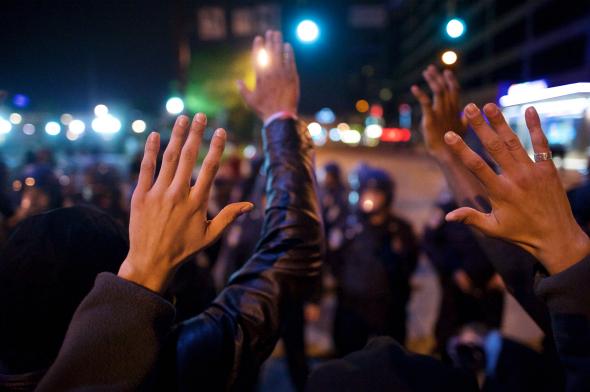 Protesters in Baltimore raise their hands as police force them off the street after a demonstration in memory of Freddie Gray in April 2015. (Mark Makela / Getty Images)
Protesters in Baltimore raise their hands as police force them off the street after a demonstration in memory of Freddie Gray in April 2015. (Mark Makela / Getty Images)
The Department of Justice on Wednesday released a statement saying there will be no federal charges against the six Baltimore officers involved in the death of Freddie Gray. The department found “insufficient evidence to support federal criminal civil rights charges.”
Gray, who was 25, was arrested and taken into custody in West Baltimore on April 12, 2015. Eyewitnesses reported the police used excessive force during the arrest. When Gray was transported in a police van, he was handcuffed behind his back and had his legs shackled but was not restrained with a seatbelt—which violated a policy put into effect six days earlier after other transport-related injuries occurred during arrests. In the police van, Gray’s neck was broken, he lost consciousness, and he died about a week later. His death set off protests by those long outraged about police violence in the city.
It was questionable why police initially pursued him. The Atlantic writes:
Authorities can’t say if there was a particularly good reason why police arrested Gray. According to the city, an officer made eye contact with Gray, and he took off running, so they pursued him. Though he’d had scrapes with the law before, there’s no indication he was wanted at the time. And though he was found with a knife, Mayor Stephanie Rawlings-Blake said, “We know that having a knife is not necessarily a crime.”
The DOJ statement says: “After an extensive review of this tragic event, conducted by career prosecutors and investigators, the Justice Department concluded that the evidence is insufficient to prove beyond a reasonable doubt that Officer Caesar Goodson, Officer William Porter, Officer Garrett Miller, Officer Edward Nero, Lt. Brian Rice, or Sgt. Alicia White willfully violated Gray’s civil rights.”
Critics of the decision expressed themselves online:
He didn’t kill himself. His body didn’t throw itself around. His neck didn’t snap itself.#FreddieGray was murdered. This isn’t justice. https://t.co/uY1CLJ2mhK
— Sam White (@samwhiteout) September 12, 2017
This is why @Kaepernick7 kneels. Shameful that his form of protest is more egregious to many than #FreddieGray‘s death is. https://t.co/CKAYLS8R6x
— The King Center (@TheKingCenter) September 12, 2017
The Baltimore Sun writes that the decision is significant because it means none of the officers will be held criminally responsible for Gray’s fatal spinal cord injury. The Sun adds that a successful prosecution would have been difficult:
The Justice Department’s decision not to bring charges in the case was anticipated by many legal observers, particularly given Williams’ rulings at the state level, as federal civil rights cases have a higher standard for securing convictions.
To secure convictions in such cases, federal prosecutors must establish that an officer willfully violated a person’s civil rights, which experts said is not an easy task.
The New York Times says that the decision is consistent with other DOJ rulings in 2017:
“This year, the Justice Department announced similar decisions in two other high-profile civil rights investigations in which men died at the hands of police officers: the shooting death of Alton Sterling, a black man in Louisiana, and the shooting death of James Boyd, a mentally ill man in New Mexico.”
The Times also notes apparent support for unnecessary police violence from the president and elsewhere in the Trump administration:
“These cases are very difficult, obviously — the state prosecution demonstrated that,” A. Dwight Pettit, a Baltimore lawyer who has represented plaintiffs in police brutality cases, said of the investigation into Mr. Gray’s death. “But I expected this to happen, based on the comments of the attorney general and the president himself. The top people in the Justice Department are saying, ‘We’ve got the back of the police.’”
Mr. Pettit referenced President Trump’s remarks in July in which he urged the police not to be “too nice” in transporting suspects. A White House spokesman later called that comment a joke, though many in law enforcement took it seriously and were quick to repudiate any inappropriate use of force.
“What can you expect from an administration that makes those comments?” Mr. Pettit said.
During the Obama administration, the DOJ conducted an investigation into the Baltimore Police Department and found that “BPD makes stops, searches and arrests without the required justification; uses enforcement strategies that unlawfully subject African Americans to disproportionate rates of stops, searches and arrests; uses excessive force; and retaliates against individuals for their constitutionally-protected expression.”
However, in the Freddie Gray case a circuit court judge acquitted two of the officers and the trial of a third ended in a hung jury; state prosecutors dropped charges against the other three accused officers in July 2016.
With an uncertain future and a new administration casting doubt on press freedoms, the danger is clear: The truth is at risk.
Now is the time to give. Your tax-deductible support allows us to dig deeper, delivering fearless investigative reporting and analysis that exposes what’s really happening — without compromise.
Stand with our courageous journalists. Donate today to protect a free press, uphold democracy and unearth untold stories.


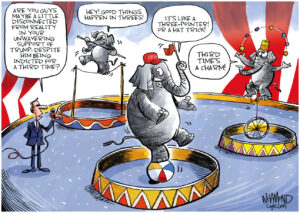
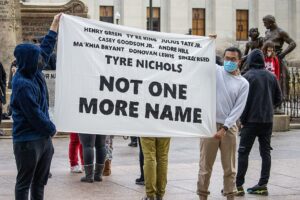
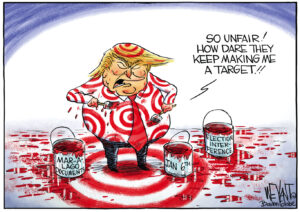
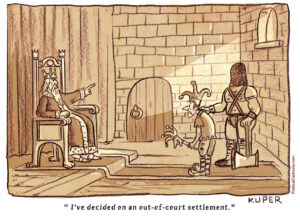
You need to be a supporter to comment.
There are currently no responses to this article.
Be the first to respond.